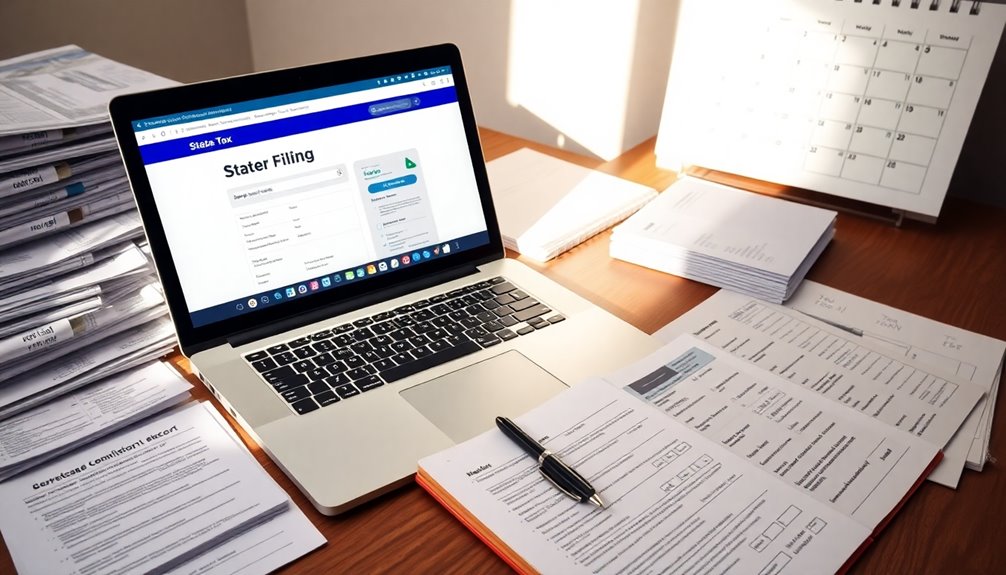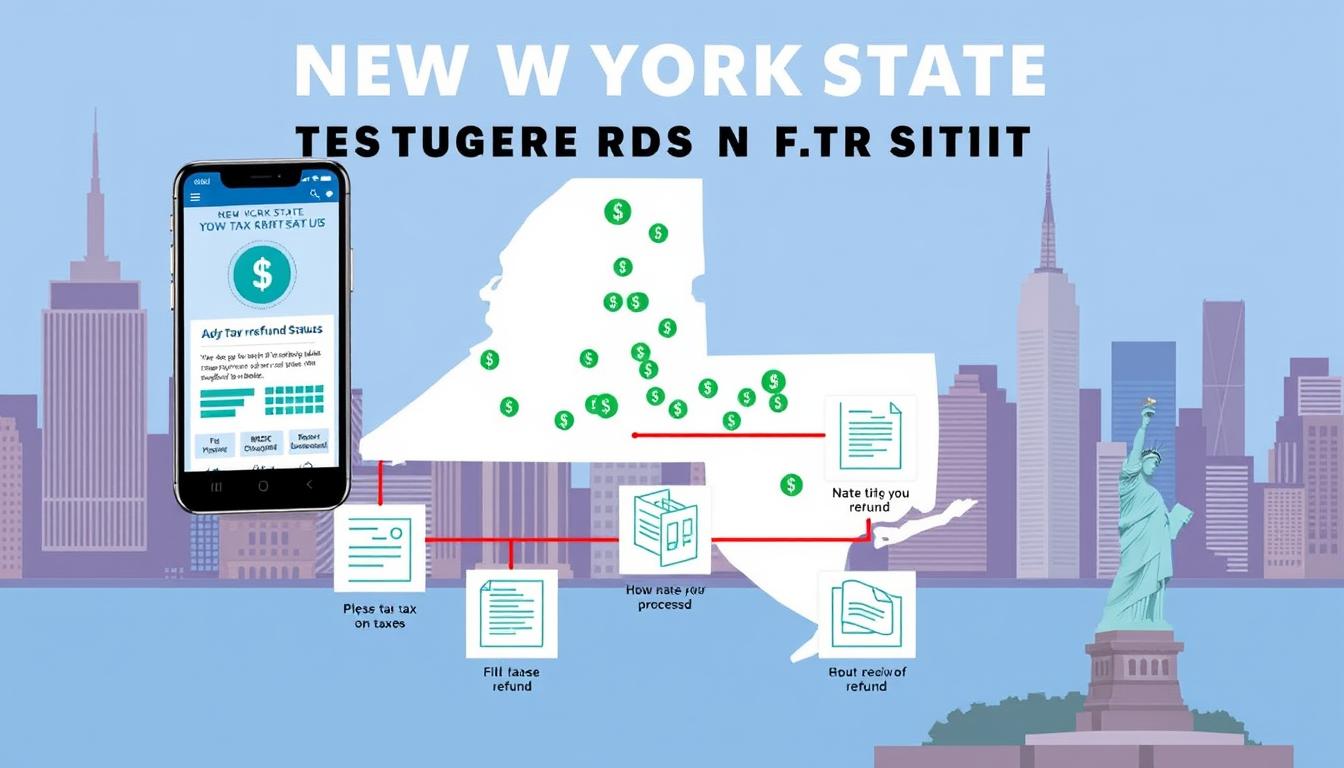To file just state taxes, start by gathering your documents like W-2s and 1099s. Make sure you understand your state's filing requirements, as these can vary. Most states follow the federal deadline, which is usually April 15. You can choose to e-file for faster processing or file manually using the correct forms. Double-check all your information for accuracy, including Social Security numbers. Don't forget to track your deductions and credits specific to your state. There's much more to navigate in this process that can help you file correctly and efficiently.
Key Takeaways
- Determine if you need to file based on your state's requirements, including income earned and residency status.
- Gather necessary documentation such as W-2s, 1099s, and any state-specific forms for accurate reporting.
- Choose between e-filing or paper filing, with e-filing offering faster processing and instant confirmation.
- Ensure all information is accurate, including Social Security numbers and income sources, to avoid common filing mistakes.
- Keep track of filing deadlines, which usually align with federal deadlines, and maintain records of income earned and taxes withheld.
Understanding State Tax Obligations

Understanding your state tax obligations is crucial for staying compliant and avoiding penalties. Many states require you to file state income taxes if you're required to file federal income taxes. If you earn income in a state that imposes income tax, you usually need to file a state return, with income thresholds varying by state and your filing status.
Some states, like Alaska, Florida, and Texas, don't levy state income tax, meaning you won't need to file a return there. However, if you earn income, even as a nonresident, you may still have to file a return in that state. This can include rental income, investment earnings, or gambling winnings.
If you earn income across state lines, you might face filing requirements in multiple states. Deadlines for state tax returns often align with the federal deadline of April 18, but some states have different due dates. Always check your specific state's rules to ensure you're filing correctly. Additionally, keep in mind that federal tax payments are also due by April 18, 2024.
E-Filing vs. Paper Filing

E-filing is becoming increasingly popular among taxpayers, and for good reason. It offers a convenient way to submit your state taxes electronically, providing instant confirmation of receipt.
You'll likely enjoy faster processing times, often within hours, compared to the lengthy manual process of paper filing. Paper filing can lead to postal delays and the risk of lost documents, while e-filing allows you to easily track the status of your forms online. Additionally, e-filing eliminates risks of postal delays or lost documents, allowing for quicker refunds via direct deposit.
Accuracy is another benefit of e-filing. Automated software performs calculations and checks for common mistakes, significantly reducing error rates. Built-in validation tools ensure your information is accurate before submission, minimizing the risk of audits.
In contrast, manual data entry on paper forms can lead to miscalculations and legibility issues.
Cost-wise, e-filing is generally more affordable. You won't have to worry about postage or printing costs, and you'll only pay for the specific forms you file.
However, some taxpayers may prefer paper filing for privacy reasons or if they lack access to technology. Ultimately, the choice between e-filing and paper filing depends on your personal preferences and circumstances.
State-Specific Filing Requirements

When it comes to filing your state taxes, knowing the specific requirements for your state is crucial. Each state has its own deadlines, withholding requirements, and general filing obligations.
For instance, if you're in Alabama or Arizona, mark April 18 on your calendar, while Delaware's deadline is May 2. Iowa gives you until May 1, and Louisiana has a slightly later deadline of May 15.
Withholding rules also vary. In California, if you earn over $1,500 for the year, withholding is necessary. In Connecticut, it's required if you perform personal services for more than 15 days. Louisiana mandates withholding for employment duties exceeding 25 days, while Maine requires it for services over 12 days with earnings above $3,000. Additionally, understanding the withholding requirements for nonresident employees based on the number of days worked can prevent unnecessary tax issues.
Nonresidents should be aware of day-based filing thresholds. For example, in Arizona and New Mexico, you must file if you work for 60 or more days and 15 or more days, respectively.
States like Arkansas, Delaware, and Nebraska require nonresidents to file if they receive income from state sources. Understanding these requirements will help ensure you file accurately and on time.
Income Tax Thresholds Overview

Income tax thresholds play a critical role in determining how much you owe to your state. Each state has its own income tax rates and brackets, which can vary significantly.
For instance, some states, like Colorado and Pennsylvania, use flat tax rates of 4.4% and 3.07%, respectively. In contrast, states like California and New Jersey have progressive tax systems, imposing higher rates on larger incomes. Additionally, understanding state tax obligations is essential for residents and taxpayers, as it influences financial planning.
Your taxable income is crucial; many states impose their top tax rates on incomes well below $40,000 for single filers, while states like California only hit that high rate for those earning over $1 million.
Moreover, if you live in a state without an income tax—like Florida or Texas—you might still face other taxation forms, though no state income tax return is necessary.
Key Due Dates for State Taxes

Navigating state tax deadlines can feel overwhelming, but knowing the key due dates helps you stay organized and avoid penalties. Most states align their filing deadlines with the federal tax deadline of April 15. If April 15 falls on a weekend or holiday, expect the deadline to shift to the next business day.
However, some states like Maine and Massachusetts may have different deadlines due to local holidays, so double-check your state's specifics. If you live in a state without personal income tax, such as Alaska or Florida, you won't have a tax filing deadline at all. For fiscal year taxpayers, remember that your return is due on the 15th day of the fourth month following your fiscal year-end. Additionally, keep in mind that some states require quarterly estimated tax payments, and those deadlines differ from federal timelines. Staying updated with your state's revenue department is crucial for these dates.
Lastly, if you miss a deadline, be aware that late filings can incur penalties and interest, so it's best to file on time or inquire about extensions.
Preparing Your State Return

Preparing your state tax return requires careful attention to detail and organization. Start by gathering necessary documents, including Social Security numbers and dates of birth for everyone you're claiming. Make sure you have forms showing any state and local income tax refunds and records of unemployment compensation.
Don't forget documentation for state-specific deductions and credits, as well as records of interest from state and local government obligations. In addition, maintaining accurate record-keeping aids in identifying potential tax credits.
Next, report all income subject to state tax, even if it's exempt from federal tax. This includes income from state and local government obligations, scholarships for incidental expenses, and any business income from S corporations, partnerships, or LLCs.
Also, include any prizes or awards you've received.
When it comes to claiming deductions and credits, deduct eligible childcare costs, education expenses, and adoption costs. You can also claim credits for charitable donations and other state-specific deductions.
Lastly, ensure you check your state tax return for accuracy before submission. If you need help, don't hesitate to contact state tax authorities or local Taxpayer Assistance Centers for guidance.
Using Approved Tax Software

Once you've gathered your documents and prepared your state return, using approved tax software can simplify the filing process.
Software like H&R Block allows you to e-file for multiple states, including Arizona and California, and provides an easy import option from your federal return. Additionally, it's important to remember that non-residents must file taxes regardless of their income status.
TurboTax, while requiring the Desktop version for separate state filings, offers accuracy and satisfaction guarantees, ensuring you're covered.
TaxAct is another solid choice, particularly for New York, supporting e-filing for current and prior years. Additionally, it includes options for estimated tax payments.
If you opt for On-Line Taxes (OLT), you'll find customer support available via phone and email, making the process more manageable.
When choosing software, consider the additional costs for filing multiple state returns, as H&R Block may charge extra for that.
Also, keep in mind that each state has unique rules. For example, Arizona and Colorado have different regulations regarding joint federal and separate state returns.
Filing Manually: Step-by-Step

Filing your state taxes manually can seem daunting, but breaking it down into clear steps can make the process manageable.
First, gather the necessary forms and documents. Make sure you have the correct year's form, like Form IT-201, and collect all income documents such as W-2s and Forms 1099-G.
Next, fill in your taxpayer information, including your name and mailing address. If you're filing jointly, include your spouse's name too. Then, select your filing status and ensure all required fields are completed to avoid processing delays.
Now it's time to calculate your income, adjustments, and taxes. Transfer your federal income to the state form and calculate any New York additions or subtractions. Decide between standard or itemized deductions. It's important to be aware that nearly half of U.S. states require nonresident income tax returns for working a single day.
After calculating your taxes, complete all required schedules and forms. Make sure only applicable forms are included, and then sign and date your return.
Before submitting, double-check for any missing entries to help prevent penalties or delays. Finally, mail your completed return to the correct address and keep a copy for your records.
Common Mistakes to Avoid

Avoiding common mistakes when filing your state taxes can save you time and hassle. First, ensure your basic information is accurate. Double-check that your Social Security number and name match exactly as they appear on your Social Security card. An incorrect filing status can lead to errors in tax brackets and deductions, so choose wisely.
When reporting income, don't overlook any sources, including wages, freelance work, or tips. If you have additional income, remember to attach Schedule 1 (Form 1040). Be meticulous with self-employment income calculations, ensuring you account for IRA rollovers and deductions accurately.
Math errors can significantly affect your tax liability, so double-check your calculations. Use tax software for assistance, but make sure you enter your data correctly.
Finally, review your filing and submission process. Verify your bank account details to avoid delays in refunds, and ensure you sign your return—both spouses must sign for joint returns.
Before hitting submit, take a moment to review your return for any typos or missing information. These simple steps can help you avoid common pitfalls and streamline your filing experience.
Keeping Records of Your Filing

Keeping accurate records of your state tax filings is essential for a smooth tax season and can help you avoid complications in the future. Start by documenting all income earned in the state, whether from jobs, investments, or other sources. If you're a nonresident, be mindful of state-specific thresholds and requirements that may apply to you.
Also, keep meticulous records of any state income taxes withheld from your paychecks. Proof of residency, such as your voter registration, driver's license, and vehicle registration, is crucial, especially if you're filing as a resident or part-year resident. Remember that your legal residence can impact your filing options and obligations based on military status.
Don't forget to track deductions and credits that apply to your state tax returns. Retain copies of previous years' returns for reference and potential audits. Familiarize yourself with filing deadlines, as they often align with federal deadlines. Some states may require additional forms, so stay informed about any special filing requirements.
Lastly, maintain detailed records in case you need to file an amended return or face an audit. Keeping your records organized ensures you're prepared for any inquiries from state tax authorities.
Frequently Asked Questions
Can I File State Taxes Without Filing Federal Taxes?
Yes, you can file state taxes without filing federal taxes, but it largely depends on your state's specific laws.
Most states require information from your federal return to complete your state taxes.
However, California is an exception, allowing you to e-file state taxes independently.
If you're in another state and haven't filed federally, you might need to file a paper return instead.
Always check your state's requirements to be sure.
What if I Moved States During the Tax Year?
If you moved states during the tax year, you'll need to consider your residency status in both locations.
You may qualify as a part-year resident in both states, requiring separate returns. Keep track of the days you spent in each state and report your income accordingly.
Check for any reciprocity agreements that might simplify your filing.
It's smart to consult a tax professional to ensure you meet all requirements and avoid penalties.
Are There Penalties for Late State Tax Filing?
Yes, there are penalties for late state tax filing.
If you file or pay your state taxes late, you could face fines, which might be a percentage of the unpaid tax—often starting at 5% per month.
Some states even impose maximum penalties of up to 25%.
Additionally, interest on any unpaid tax adds to your burden, so it's crucial to file on time to avoid these unnecessary costs.
Always check your state's specific rules.
How Can I Check the Status of My State Tax Return?
To check the status of your state tax return, visit your state's tax authority website.
Look for tools like "Where's My Refund" or "Refund Status." You'll need to enter your Social Security number, filing status, and refund amount.
If you don't see an update right away, check back later, as some states refresh their information periodically.
If you're still unsure, consider calling your state's tax department for assistance.
What Documents Do I Need for State Tax Filing?
When you're preparing to file your state taxes, you'll need several key documents.
Gather your government-issued photo ID, Social Security number, and income documents like W-2s or 1099 forms.
Don't forget deduction records, such as mortgage interest statements and charitable donations.
If applicable, include your spouse's information.
Lastly, check for specific state requirements, like withholding statements or healthcare forms, to ensure your filing is complete and accurate.
Conclusion
Filing your state taxes doesn't have to be overwhelming. By understanding your obligations, choosing the right filing method, and keeping track of due dates, you can simplify the process. Whether you decide to e-file or go the manual route, just remember to avoid common mistakes and maintain good records. With the right preparation, you'll not only meet your tax responsibilities but also ensure you maximize any potential refunds. Stay organized, and you'll breeze through it!









